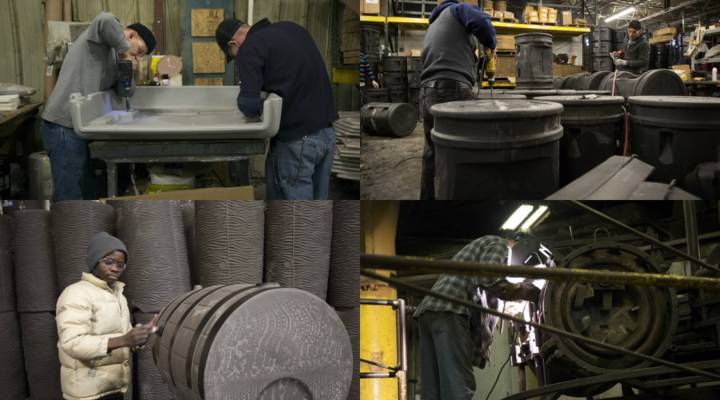
Health care costs are pricey in the small business world

Thursday, the Senate’s health care bill, version 2.0, will be made public. The contents will be closely scrutinized in both policy-making circles as well as business circles. Smaller businesses, in particular, will be interested because providing health care benefits can be a significant expense for them. Cary Quigley runs Sterling Technologies, a manufacturer of large plastic containers, in Lake City, Pennsylvania. Marketplace host Kai Ryssdal first met with Quigley in Pennsylvania around Inauguration Day. This week, he called Quigley again to check how his company is doing when it comes to health care and the economy. The following is an edited transcript of their conversation.
Kai Ryssdal: First of all, how’s business? How’s life at Sterling?
Cary Quigley: Business is Okay. We’re still growing. We’re still working and still good, still running 24/7.
Ryssdal: Wow, alright, well you can’t get much more busy than I guess. When we were out there in January, one of the things you and I talked about, as a straight business issue for you guys, was health care, Obamacare and how much you were looking forward to repeal. So with that background, how are you feeling about all the back and forth in Washington on health care reform?
Quigley: Yeah, you know great question. There still seems to be a lot of smoke in the air. But some things are starting to clear up for us and it looks like things like the individual mandate, employer mandate are really going to make a huge difference, particularly to our workforce, who is relatively young. So we’re pretty excited about some of the reform that we think we’re going to see come out of this.
Ryssdal: Let me make sure I get that right, you are looking forward to not having to deal with health insurance basically?
Quigley: Well yeah, I mean health insurance is a part of our compensation package. But some of those mandates that were there and the possible budgeting issues that we were running into as a company made it very difficult for us.
Ryssdal: If I remember right, you said if you had to keep going with the Affordable Care Act you were teetering on going out of business?
Quigley: Yeah you know there was so much cost there that becomes very difficult for a small business like us where we’ve got 160, 165 people and those health care costs continue to rise. It’s very difficult to budget that and understand what impact it is going to have there. Our customers are not going to take a price increase because our insurance costs go up. They’re just not interested in hearing it.
Ryssdal: What happens if, in your mind, health care does not get fixed?
Quigley: If health care doesn’t get fixed, and the Affordable Care Act or Obamacare continues to be instituted, and all these employees are forced to take insurance. I am heavily concerned on those costs and what they do to us just being able continue to operate.
Ryssdal: Literally going out of business, is what we’re talking here?
Quigley: Well sure. I mean you can’t operate a business and continue to not make money. So eventually if you can’t make money, it’s foolish to continue to operate a business.
Ryssdal: Let me get you off health care for a second, and ask you, bigger picture how you’re feeling, six something months into the Trump presidency, about business and the regulatory environment and how things are going for you?
Quigley: Well I feel pretty good when we start looking at unemployment rates that are lower than we’ve seen in over a decade. Starting to see some of the tariffs possibly getting imposed. For us in the plastics business, we love to see tariffs that could be imposed on our neighbors to the north. You know certainly there is no perfect administration, I don’t think, but it is nice to finally see some change.
Ryssdal: You mentioned you’re going 24/7. Are you so busy that you would have to hire to fill those three shifts?
Quigley: We’re actually currently in a hiring mode looking for employees now.
There’s a lot happening in the world. Through it all, Marketplace is here for you.
You rely on Marketplace to break down the world’s events and tell you how it affects you in a fact-based, approachable way. We rely on your financial support to keep making that possible.
Your donation today powers the independent journalism that you rely on. For just $5/month, you can help sustain Marketplace so we can keep reporting on the things that matter to you.

















